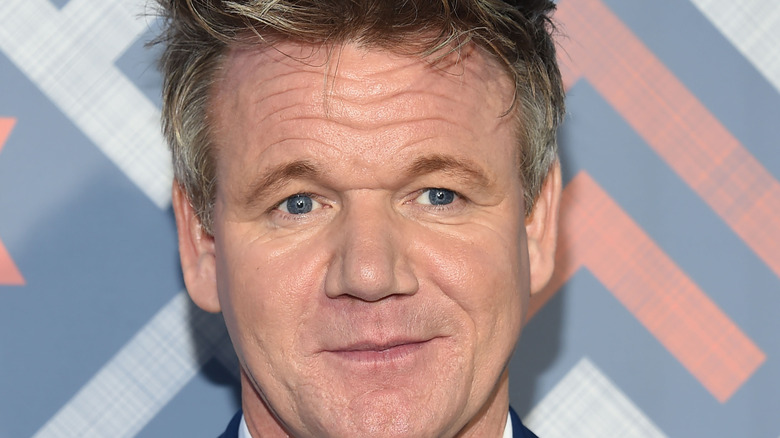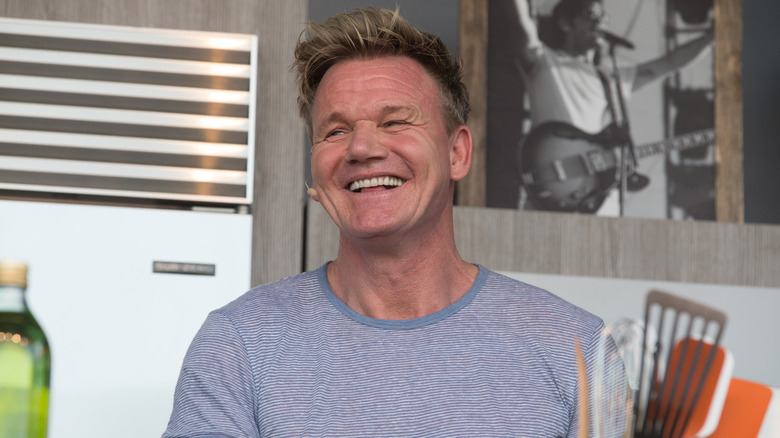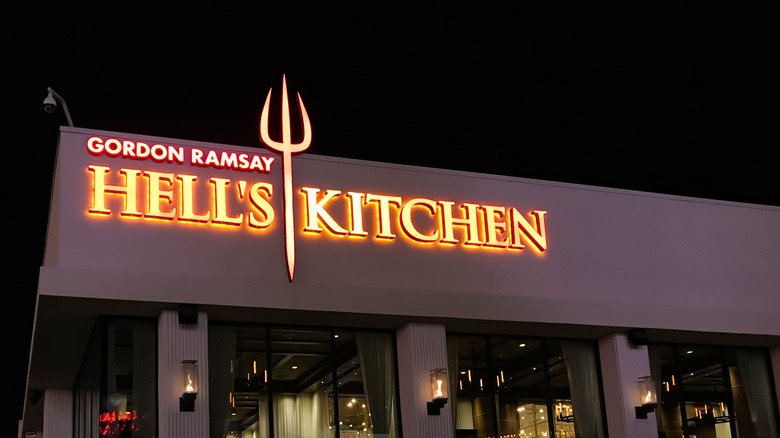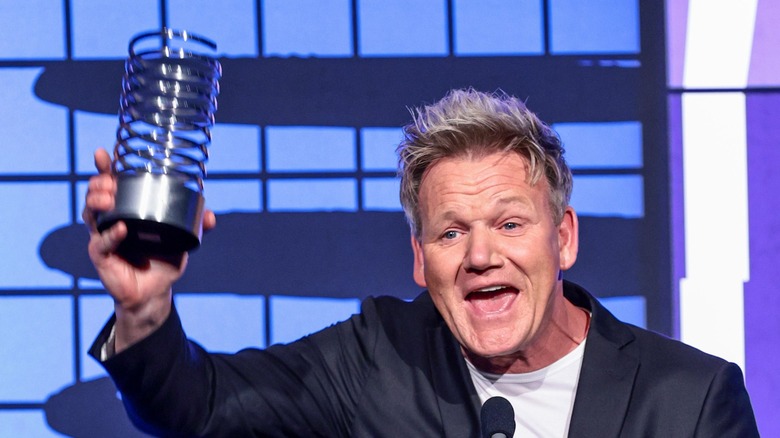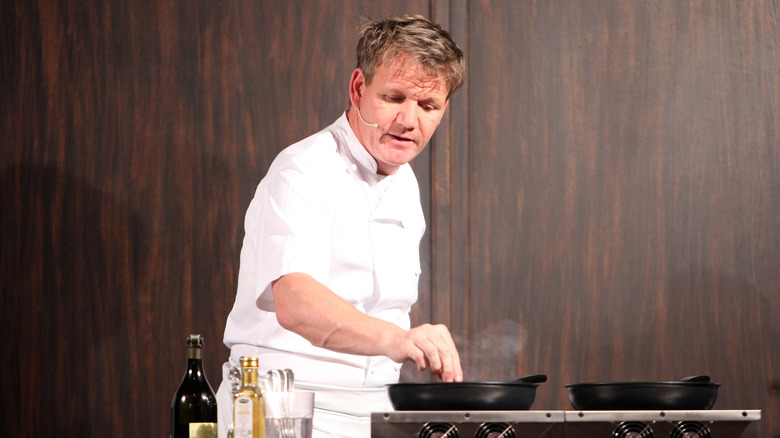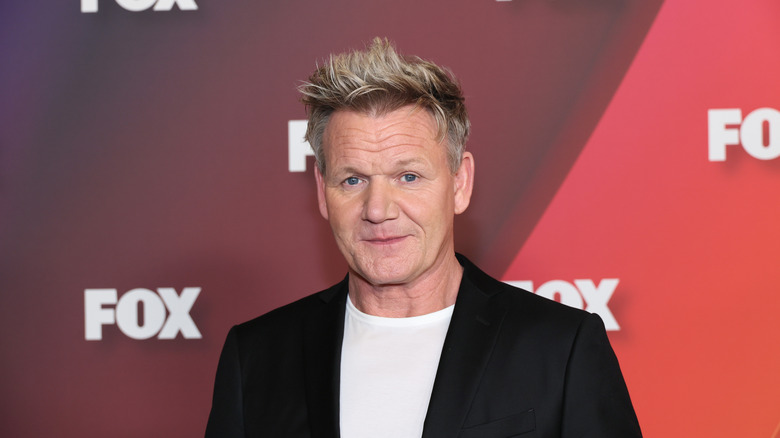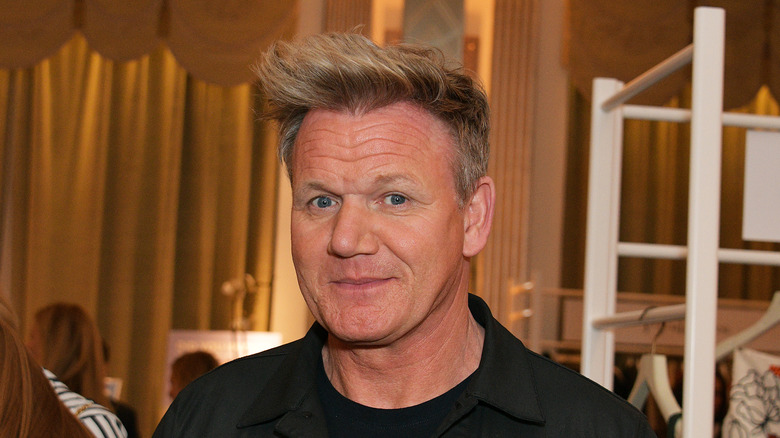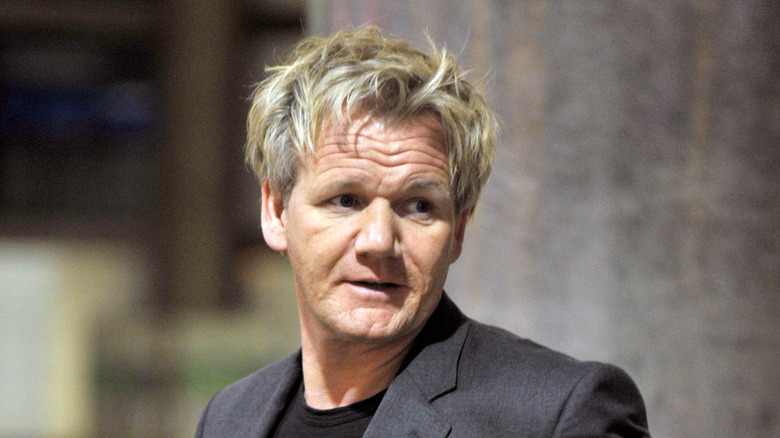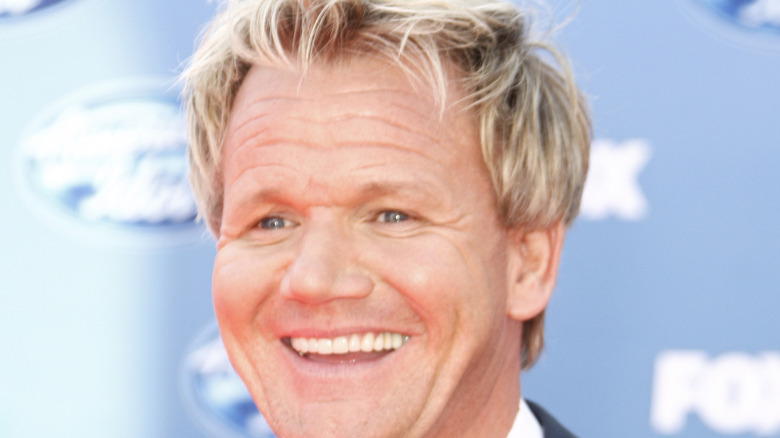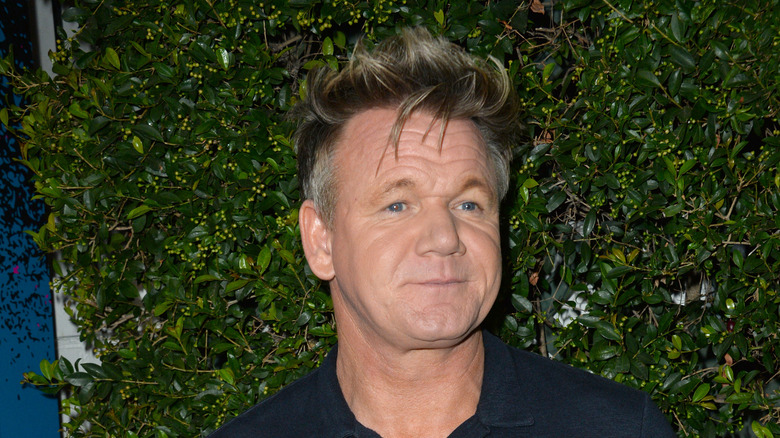Gordon Ramsay Was Never The Same After Hell's Kitchen
When reality cooking competition "Hell's Kitchen" first aired in the U.S. in 2005, as per The Hollywood Reporter, Gordon Ramsay was virtually unknown to American audiences. A respected chef in his native UK, he made his television debut in 2004 in the British version of "Hell's Kitchen," a two-week live miniseries in which Ramsay directed (and loudly berated) a team of celebrity cooks, including members of Parliament.
It was his personality, rather than his culinary reputation, that got him cast on the show. "I've spent another lifetime looking for another Gordon — that charisma and that ability to command a camera — and nobody else ever quite compared," ITV executive and talent scout Natalia Znak told The Hollywood Reporter. "It's not anger you're watching; it's passion, that attention to detail." While programmers at Fox were intrigued by the idea of bringing "Hell's Kitchen" to the U.S., they were also nervous. "Nothing like that had been seen before on U.S. television," ITV head Paul Buccieri said of Ramsay's colorful way of doing things (via The Hollywood Reporter).
They needn't have worried. American audiences ate up his verbal gymnastics, and the show has recently been renewed through its 22nd season, according to Deadline. And through all those years, "Hell's Kitchen" has transformed Gordon Ramsay's life in ways he could not possibly have imagined.
Hell's Kitchen launched Gordon Ramsay's US television career
Before "Hell's Kitchen," Gordon Ramsay had a sterling reputation in Britain as a chef and restaurateur. His flagship restaurant, Gordon Ramsay at the London, has held three Michelin stars for 21 consecutive years, per the Daily Record. No one would have faulted him for choosing to continue on this career trajectory, which offered plenty of respect and publicity without the risk of becoming a public lightning rod.
But instead, Ramsay chose to lean in to the TV persona of a short-tempered, foul-mouthed perfectionist. The success of "Hell's Kitchen" led to his next show, "Kitchen Nightmares," in which each episode had Ramsay spending a week at a struggling restaurant attempting to whip its business model, menu, and incompetent owners into shape.
The U.K. version of "Kitchen Nightmares" debuted in 2004, and the U.S. version in 2007, according to Variety, though Ramsay decided to end both shows in 2014. This was only the start of his U.S. TV career, as he soon launched other popular shows, including "MasterChef," "MasterChef Junior," "The F-Word," and "24 Hours to Hell and Back."
Gordon Ramsay turned Hell's Kitchen into a real restaurant
Reality shows such as "Hell's Kitchen" capture our imagination because they've got all the drama and thrills of real life, but in a concentrated and curated form. Unlike in true reality, you don't have to endure all the boring parts to get to the fun stuff. Certainly, any number of us have wondered what it would be like to experience the adrenaline-laced atmosphere of a reality show. Just as many must have considered what would it really be like to make (or just eat) a meal that met Gordon Ramsay's exacting standards.
Enough "Hell's Kitchen" fans wondered this that Ramsay decided to turn "Hell's Kitchen" into an actual restaurant. "We responded to fans of the show who were hungry for a real-world "Hell's Kitchen" restaurant for some time — pun intended," Ramsay told Drift. "What we didn't fully realize was just how enthusiastic the response would be. We are thrilled with the reservations and interest since announcing our opening."
The concept has proven so popular that Ramsay opened several more "Hell's Kitchen" restaurants, with outlets in Dubai and Lake Tahoe, along with a planned location in San Diego, according to SanDiegoVille. The restaurants, modeled after the show, feature open kitchens with cooks dressed in the same uniforms as the show's contestants (per Drift). However, all cooks are vetted professionals, and, sorry, you won't hear Ramsay swearing at them.
Ramsay has learned to watch his language
Over its two-decade run, "Hell's Kitchen" has retained the same look and format — and Gordon Ramsay has maintained the same cantankerous persona he so dramatically put on display at the very beginning of the series. And viewers seem to like it that way. "So as long as the formula is working, there's no real reason to go away from it in a dramatic way," "Hell's Kitchen" showrunner Kenny Rosen told Reality Blurred. "As long as we're keeping it fresh, then there's no reason to mess with the formula, because the formula works."
But "keeping it fresh" still means that some things have subtly changed over time. Consciously or not, Ramsay has changed, too. In early seasons, Ramsay shocked audiences and contestants with borderline obscene (or outright obscene) insults, once comparing a cook's preparation to a bison's genitals.
But according to Season 3 winner (and longtime "Hell's Kitchen" fan) Rock Harper, Ramsay has mellowed in recent years — "mellow" being a relative term, of course. "When you look back, he was much more brutal, I believe," Harper said. "I think he's still really tough, but the way that it's presented — certain things that he doesn't say anymore, whether they be catchphrases or just things that [would] probably get him canceled today." Furthermore, Rosen said, Ramsay's softer, off-camera persona is no longer a secret. Contestants now know they can expect supportive mentoring from him, along with the on-camera insults.
He remains unafraid of controversy
Since launching "Hell's Kitchen," Gordon Ramsay may have learned to control his language (at least to a limited degree), but that doesn't mean he's turned into a paragon of diplomacy. Even fairly recently, his salty sense of humor has gotten him into some seriously hot water. According to NBC News, in 2021, he triggered a firestorm on TikTok after posting a video of himself climbing into a pen of lambs while saying "Who's going into the oven first? You! Oven time!"
While the video garnered close to 1 million likes, many viewers were outraged. "What a classless, out-of-touch and heartless way to treat another sentient being," one commented. While Ramsay later said "No animals were cooked in the making of this video," he's not the first classically trained chef to reveal a coldly transactional attitude towards animals. In his memoir (per Publishers Weekly), veteran chef Jacques Pepin recalls stopping by a roadside stand to buy live ducks for dinner. He matter-of-factly wrung their necks before tossing their bodies into his car, to the mortification and outrage of the seller.
He's made peace with plant-based diets
In the two decades since the debut of "Hell's Kitchen," Gordon Ramsay has experienced some huge changes in his life, including his stratospheric growth as a TV personality and multiple new restaurants, just to name a few. But for many of his fans, his biggest and most surprising transformation came with his sudden embrace of something he'd long loathed just on principle: plant-based cooking.
So loudly and virulently had he hated the very idea of such a diet that he even forbade his five children from becoming vegetarians. "My biggest nightmare would be if the kids ever came up to me and said, 'Dad, I'm a vegetarian.' Then I would sit them on the fence and electrocute them," he told Cornwall Live.
It's unclear exactly what triggered his change of heart, but he suggested to People that his children finally wore him down. "Thanks to the kids, I've realized it's ok to be vegan...SOMETIMES!!!" he said in a statement. While he doesn't keep a fully vegan diet himself, he now takes vegan cookery seriously enough to present his first-ever vegan cooking challenge on "MasterChef: Back to Win." His website also offers vegan recipes for fans to try at home. "Cooking a meat- and dairy-free meal doesn't mean you have to settle for anything less than delicious," he wrote on the site.
Ramsay has rethought the challenges on Hell's Kitchen
Gordon Ramsay's central goal for "Hell's Kitchen" has remained unchanged: to find and train chefs good enough to lead teams in his restaurants. To this end, per FoodSided, he designed a series of challenges for the show that would showcase each cook's strengths, weaknesses, and personality.
But just as teachers who recycle the same exams every semester find that students know a bit too much about what lies ahead, Ramsay discovered that new cohorts of chefs came to the set ready for his "surprise" challenges. In particular, he found that everyone came fully prepared for the signature challenge, in which each cook would prepare a personal signature dish. One contestant, Ramsay told FoodSided, had practiced making his signature dish 52 times.
But Ramsay was looking for chefs who were able to think on their feet and handle unfamiliar challenges under pressure. It was clear that the signature challenge was no longer testing that skill set. "Do you think that I'm that stupid that I want to see the dish that you have rehearsed?" he asked. Instead, for Season 19, he challenged cooks to make their own versions of favorite Las Vegas main dishes, such as lobster. He knew this change would be more stressful for contestants. However, he said that it would show them "what they need to do to get them to the premiere league."
He was devastated when his restaurant lost its Michelin stars
Gordon Ramsay is proud to be a perfectionist. Certainly, "Hell's Kitchen" established his reputation for taking down anyone who fails to meet his exacting culinary standards. He's been happy to share his brutal critiques with everyone from the seasoned pros on "Master Chef" to home cooks on Twitter. His attacks sting all the more because he's not just some armchair critic mindlessly lobbing insults — Ramsay's restaurants have amassed a total of 16 Michelin stars over the course of his career (per Truly). His critiques land hard because we know that he can meet the standards he demands of everyone else.
So it was devastating for him when his New York City restaurant, Gordon Ramsay at the London, was unceremoniously stripped of its two Michelin stars in 2013. "I started crying when I lost my stars," he said on Swedish and Norwegian talk show "Skanlan" (via Eater). "It's a very emotional thing for any chef. It's like losing a girlfriend. You want her back. I think every top chef in the world, from Alain Ducasse to Guy Savoy, when you lose a star it's like losing the Champions League."
This humiliation was especially brutal given that it represented the first time in Michelin history that any restaurant had lost both its stars due to "quality issues," as per Eater. "We've had issues with consistency, and consistency is a huge thing for us," Michelin Guide director Michael Ellis told Bloomberg.
Simon Cowell convinced Gordon Ramsay to get cosmetic surgery
Gordon Ramsay's long journey from chef to TV celebrity brought yet more changes he hadn't counted on. When he started "Hell's Kitchen," his on air persona was all about his fiery personality. His rugged, not exactly sweet face was a big part of that image. After all, nobody expects chefs to look like boy band members, do they?
So when Ramsay first moved to Los Angeles, where the U.S. edition of "Hell's Kitchen" was originally taped, he initially brushed off Hollywood insiders' critiques of his looks. "In L.A. it was all 'Oh my god, when did you go through the windscreen?" he told the Radio Times (per Esquire).
But over time, the comments and public pressure started to wear even Gordon Ramsay down. "You put up with it, but then you get f-ing sick of it," he said. It was a fellow talent show host known for biting critiques who finally convinced Ramsay to go under the knife. "I took Simon Cowell's advice and had the lines on my chin filled in," he told the Daily Mail. He claimed that was the end of the cosmetic work, though some fans believe he kept up with it in the following years.
Gordon Ramsay is spending more time in Las Vegas
The U.S. version of "Hell's Kitchen" was initially taped in Los Angeles. But in 2018, for Season 19 of the show, Gordon Ramsay and his production team moved the show to a new set in Las Vegas, according to Reality Blurred. This move reflected a larger trend that saw many reality shows leaving Hollywood for Vegas — "Shark Tank" and "Love Island" had also relocated to Las Vegas in the preceding years.
Trends weren't behind Ramsay's reason for wanting the change, however. "With Gordon having so many Caesars [Palace] properties, Caesars was interested in having us show off their properties in Vegas, and so they helped budgetarily get us there," "Hell's Kitchen" executive producer Kenny Rosen explained to Reality Blurred. "They were completely amenable to our using all of their facilities, restaurants, pools, exclusive areas for shooting so we could help promote their properties and Gordon's restaurants at the same time."
Ramsay and Caesars weren't the only ones pleased by the change. "Oh my god, it was so nice to get out of L.A.," Rosen said. "Vegas really lends itself to all sorts of craziness and fun stuff that we wouldn't have been able to do if we'd shot in L.A. again."
Gordon Ramsay's fame makes it easier to cast Hell's Kitchen
When "Hell's Kitchen" first aired in the U.S., American audiences found themselves watching a then-unfamiliar chef yelling at a beleaguered cast of unknown cooks. Fascinating as Gordon Ramsay was to watch, most American fans knew nothing of his culinary reputation across the pond. "Our first season we went shot out on the corner of Hollywood and Vine for our final challenge with the final two doing their dishes on the street," as "Hell's Kitchen" showrunner Kenny Rosen told Reality Blurred. "[Nobody] in Hollywood and Vine and in the heart of Hollywood was recognizing who Gordon was other than one British family that walked by, and they're like 'Oh, Gordon, what are you doing here?'"
But all that has very definitely changed. Ramsay's fame from "Hell's Kitchen" not only made him a household name in U.S., but his increased profile has made it easier to find strong cast members who understand the value of working with him. "From a casting standpoint, [it's] easier to produce right now because Gordon is so well known," Rosen said.
This notoriety has enabled the show to recruit higher-quality contestants. "I'd say our final four was the most competitive final four chefs we've ever had, said Rosen, "and they all had great personalities, so it was kind of an embarrassment of riches at the end of the season."
Gordon Ramsay became a fitness buff
For chefs, weight gain is an obvious occupational hazard. If you're passionate about food, work with it all day, and are serious about quality control, there's a good chance you'll end up consuming more calories than your body needs on a regular basis. The old adage "never trust a skinny chef" didn't originate out of nothing.
Gordon Ramsay wasn't immune to this hazard. As his culinary empire grew following the launch of "Hell's Kitchen," so did his workload. Between producing his television shows and running his restaurants, his life grew increasingly hectic and unhealthful. "'I was overweight, 18 stone. I looked like a sack of s***," Ramsay told the Daily Mail.
Not only did he start feeling self-conscious about his weight, but it became clear that Ramsay had more serious concerns. His father had died of a heart attack at age 53, around the same age Ramsay was when he realized he was overweight. To add to the pressure, Ramsay's wife, Tana, a serious fitness buff, told him point-blank that he was getting fat. So Ramsay took radical action. He hired a champion triathlete as a personal trainer and embarked on a intense regime of fitness and endurance training, including swimming, cycling, weight training, and running marathons. His efforts paid off, not only enabling him to lose 50 pounds, according to Men's Journal, but to complete an Ironman triathlon alongside his wife.
